LOCATION
Bogota and Ibagué, Colombia
PARTNERS (UNIVERSITY/COMMUNITY PARTNER ORGANISATION)
University of los Andes, University of Ibagué, CINDE Foundation.
DESCRIPTION
In Colombia and Latin America there is a long tradition in the field of participatory action research (CBPR) and pedagogical proposals to generate curricula for training researchers, that’s why the design of our course is based on the pedagogical principles of critical pedagogy and socio-constructivism mainly, retaking postulates such as Freire´s (2005) who raise education as a practice of freedom and social change, and highlights the political and ethical character of the educational process. The approaches of education as a liberating practice constitutes, on one hand, a paradigm that, anchored in history, dialectic and transformative praxis, proposes a way of understanding the historical, economic and political conditions of societies and the political role of human as reality makers; on the other hand, it constitutes a political proposal of social change. The purpose of this approach is the radical and structural transformation of the bases of oppression and domination of peoples. The other perspective on which the Hub will base the course is based on Falls Borda’s ideas about the education process referring to the student-centered education and the philosophy of “learning by doing”, his proposal of sentipensamiento (feeling-thinking) and the importance of praxis and the decolonization of knowledge. We will also be guided by the postulates of socio-constructivism (Coll, 2001, Vigotsky, 1990) which considered that the individual construction of knowledge carried out by trainees is immersed in the collective construction accomplished by facilitators and trainees in a specific culturally organized environment in educational devices. This approach also prioritizes social change and the learner is considered as an agent of social change. Therefore, the apprentice is not passive concerning the process of its development and is he who is stimulated by his means, composes and builds his own conceptual and symbolic fabric.
Focus of the Hub and the local course reference to the UN SDGs and other emphasis
The Hub Colombia will be guided by SDG 16 (Promote peaceful and even societies for sustainable development, provide access to justice for all and build effective, accountable and even institutions at all levels), creating conditions of possibility to facilitate critical awareness and autonomy towards multiple re-existences. In this sense, the Hub will seek to form competencies that privilege emotional intelligence, active listening, self-reflection, justice, ethics and solidarity based on the principles of imperfect peace. Our perspective will be action-research for peace and our mission statement will be focused on creating conditions of possibility to facilitate critical awareness and autonomy towards multiple re-existences.
How does the CBPR course(s) fit into the academic structure of the hub university learning objectives and/or Strategic Plan (if applicable)?
In the case of the Hub Colombia, we will consider the academic structure of the two universities that integrate it (University of Los Andes and University of Ibague), this will allow the course that responds to the statements of both universities and we will also work with the training structure of our partner Cinde Foundation. One of the main aspects highlighted in the mission statements of the University of Los Andes is the importance of integral education and engagement of the uniandina community with the different regions of the country through social responsibility and commitment to the environment. The structures that will be involved in the course process will be the Research and Academics Vice Presidents, the Office of Continuing Education, the Faculty of Education and the Faculty of Engineering.
The University of Ibagué understands higher education as a strategy and an opportunity for personal improvement and realization of those who have to intervene in the transformation of their environment, for the benefit of the regional community and society in general. The University of Ibagué seeks the recovery of the essential values of the person, the strengthening of democracy, respect for human rights, equity and justice and the affirmation of regional and national identity.The structures that will be involved in the course process will be the Faculty of Humanities, Arts and Social Sciences, Special Projects, Research Directorate and Education Center.
In relation to CINDE, we unleashed one of its objectives which aims to: Carry out research, human development, social and educational programs and projects alternative to conventional and sustainable models, that have social impact, that serve as a basis for the solution of existing problems in Colombia and other countries and that tend for the improvement of the quality of life of early childhood, childhood, adolescence, youth and their families, as special constitutional protection subjects, within a rights, life cycle and gender approach.Our course will also be based on what that goal raises and we will work on strengthening communities through training in CBPR approach.
University of los Andes hosts the 4th Cohort face to face Mentor Training Program (2019)
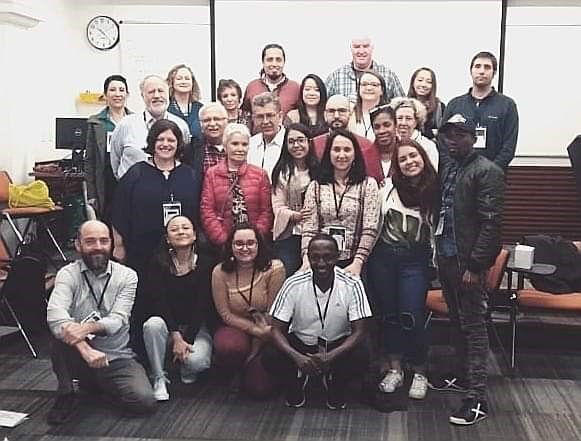
MENTORS
Irma Alicia Flores Hinojos
Psychologist from the National Autonomous University of Mexico (UNAM). She has a specialization in Community Development from the Japan International Cooperation Agency (JICA), a Master’s Degree in Clinical Psychology and another in Educational and Social Development, as well as a Doctorate in Social Sciences, Childhood and Youth from the University of Manizales, Colombia . . She is currently an Associate Professor at the Faculty of Education at the Universidad de Los Andes, Colombia. In his research, he is dedicated to exploring the facilitation of training processes in participatory, pedagogical and educational action research for professionals in education and other disciplines. He has worked with different communities in adult education and in higher education programs in Mexico, Colombia and Cuba. He has also been involved in curricular reforms in higher education and in universities with an emphasis on educational inclusion and a focus on the Sustainable Development Goals. He trained as a community-based participatory research mentor in the first cohort of the K4C Consortium’s Mentor Training Program.
Andrés Felipe Astaiza Martinez – Universidad de Ibagué
Teacher-researcher with experience in the field of higher education in the areas of psychology, social sciences and systemic thinking. I also have experience in planning and coordinating educational projects, and providing individual and group psychopedagogical support to students. Since 2018, I have been working at the University of Ibagué, Colombia, where I conduct research on the teacher-researcher training processes in the university context, citizen training, and systemic thinking. I am a part of the fourth cohort of the Mentor Training Program of the K4C Consortium.
andres.astaiza@unibague.edu.co
Daniel Lopera Molano – Universidad de Ibagué
Daniel Lopera Molano is an Industrial Designer from Pontificia Universidad Javeriana, Master in Designing Futures from Griffith University, Australia; and Master in Education from Universidad de los Andes, Colombia. He currently serves as Dean of the Faculty of Humanities, Arts and Social Sciences at the University of Ibagué. He was the creator and first director of the Design program at the University of Ibagué, an academic proposal structured on the basis of ontological design, futuring and designs for/by/with the global south, which has been in existence for 7 years. He has developed research-action projects with peasant communities and ex-combatants on issues of autonomy, collective construction and transition.
daniel.lopera@unibague.edu.co
Luisa Fernanda González Pineda.
She has a Bachelor’s Degree in Biology and Chemistry from the University of Caldas, Colombia and a Master’s Degree in Education from the Faculty of Education of the University of Los Andes, Colombia, where she is currently pursuing my PhD. She has participated in qualitative research and participatory action research (PAR) in different regions and contexts in Colombia ranging from basic and secondary education to higher education, with students, teachers and managers. In the development of her doctoral research, she is working with a school community, in which a process of co-construction of a curriculum for all has begun through the transformation of teaching practices in the classroom through participatory methodologies. She belongs to the fourth cohort of the K4C Consortium’s Mentor Training Program.
PROJECTS OF THE HUB WITH BRIEF DESCRIPTION
Case studies of locally conducted research/teaching
- Irma Alicia Flores Hinojos
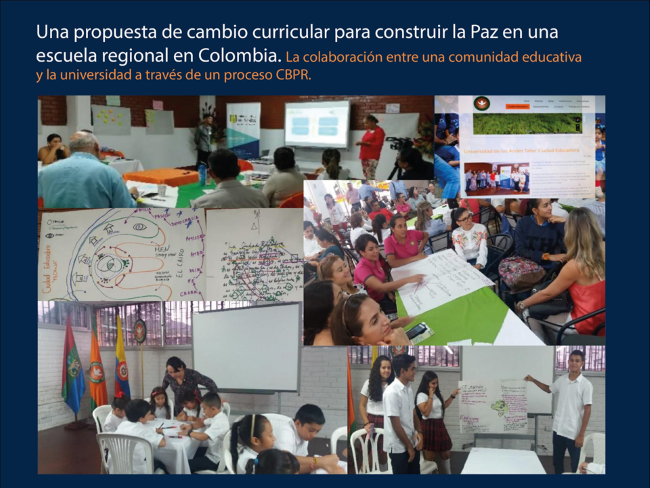
A proposal for a curricular change to build Peace. Collaboration between an educational community and the university through a CBPR process.
This case study was carried out within the framework of the MTP training, of the initiative “Knowledge for Change (K4C): An International Consortium for Education in Community Based Research (CBR)”, under the direction of Dr. Budd Hall & Dr. Rajesh Tandon, UNESCO Co-Chairs in Community Based Research and Social Responsibility in Higher Education. The following is a timeline showing the sequence of actions that have been carried out so far between the team from Universidad de Los Andes and the Colegio Espíritu Santo community in the city of Villavicencio, department of Meta in Colombia. to achieve the objective of curricular transformation.
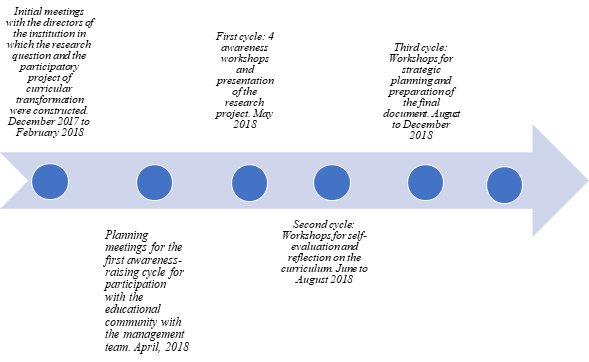
Figure 1. Timeline of the participatory research process with the community of Colegio Espíritu Santo for the curricular transformation towards the Educating City
The first meetings were held between the directors of the Espiritu Santo School of Villavicencio, department of Meta, Colombia, and the team of the Faculty of Education of the Universidad de Los Andes under my leadership. The main objective of this alliance between the educational community of the school and the university researchers is to join efforts to promote processes of change and improvement so that the school achieves its objective of being an institution that trains local and global citizens, responsible, committed injustice and social peace. This report was organized into six main sections. The first presents some background to the project and the context in which I find myself developing my fieldwork. The second presents some reflections about the reasons why it is important to carry out an investigation from the CBPR perspective, in a school like the Holy Spirit and how this process is articulated with the corresponding SDG 16 with the objective of Hub Colombia from the which I will serve as a mentor for Knowledge for Change (K4C): An International Consortium for Education in Community Based Research (CBR). The third narrates how the co-construction of the project for the curricular change of Colegio Espíritu Santo and its transformation towards the Educating City was carried out between the directors of the school and the university team. In the third, the development of the first cycle of research is narrated, the objective of which was to sensitize the educational community by presenting the project for curricular change and reflection actions, information on the reflections was collected through discussion and reflection groups, mapping and collage making. Some of the results of this experience were presented through an Infographic and the preparation of a document on the ethical principles that will guide the research.
- Luisa Fernanda González Pineda.
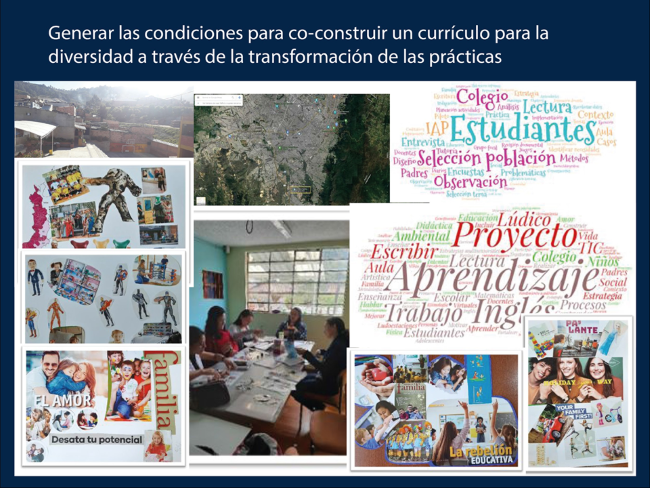
Promote the conditions to co-build a curriculum for all
The incorporation of cultures, policies, and practices in educational systems is presented as a relevant educational innovation and for the daily life of the institutions that bet on inclusive education. The foregoing has led to the construction of national and international public policies to guide implementation processes and promote quality education for all. However, educational institutions need to establish their conditions so that in a participatory way they can respond both to the policies and to the needs of all their students.
This study aims to generate the conditions to co-build a curriculum for diversity. This was possible under the approach of Participatory Action Research (PAR), in which collaborative learning was privileged to promote self-training, both individually and collectively. With this, we are able to reflect on individual practices and those that interact in the social world that is shared. In addition, the design for these meetings was developed from the approaches and proposals of participatory methodologies and art-based methods.
During this research cycle, we held several meetings with the professors and directors of an official school in Bogotá. Through these spaces, we learned about the imaginary that teachers have when investigating. We build ethical agreements. We identify the elements that facilitate and prevent the development of inclusive education. We recognized the actions and strategies that, from the roles of classroom teaching, support teaching and guidance, are developed. We identify and reflect on the elements of teaching practice that are related to the implementation of inclusive education. We plan the actions for the next cycle of the investigation.
The results of this cycle allowed us to observe that teachers relate the action of research with undergraduate and graduate studies, although they mention IAP, they do not mention reflective processes in the classroom, practice or self-observation. For teachers, the participatory construction of ethical agreements for research was decisive, because from the beginning the democratic construction of knowledge was visible and they understood their teacher-researcher role throughout the research process. Identifying the elements that facilitate and prevent an inclusive educational process allowed classmates to learn about the strategies that are implemented in the classroom.
The process of this research allowed us to make decisions regarding the actions for each encounter, thus generating the conditions to co-construct a curriculum for diversity. The next cycle of research will focus on reflection and transformation of practice to co-construct a curriculum for diversity. This democratic construction of knowledge expresses the need to mobilize ourselves towards the reflective practice raised by Schön (1998) and the importance of this research that seeks to recognize and value teaching experience through constant reflection of reality in action and on the action (Perrenoud, 2007). However, the most important thing is to leave in the community the capacity and tools to continue, strengthen and undertake new directions oriented under the principles of democratic co-construction of knowledge (Tandon, R., et al, 2016)
- Daniel Lopera Molano
This project established collective reflection–action processes that worked in conjunction with four critical learning objectives, as specified by the Bachelor Design Program. Workshops were conducted for the co-creation of a collective brand of coffee that brought together victims and victimisers in a joint process of reconciliation and memory sharing. Through the generation of a special coffee brand called The Third Agreement – which is now being commercialised – memories of the territory’s autonomous peace processes and the community’s self-validation efforts were recovered and developed. Critical skills were also developed in students and communities so that they could understand the implications of producing a design that would capture the market, while also recognising the importance of building transition paths for participants, especially in the contexts of war and peace (Lopera-Molano & Lopera-Molano, 2020, p.1).
- Andrés Felipe Astaiza Martinez – Universidad de Ibagué
Children participation in the transformation of environmental issues in the Vereda El Neme. A CBPR experience.
This field study was carried out in the framework of the MTP training of the initiative “Knowledge for Change (K4C): An International Consortium for Education in Community Based Participatory Research (CBR)”, under the direction of Dr. Budd Hall & Dr. Rajesh Tandon, UNESCO Co-Chairs in Community Based Research. This report presents a CBPR process, where the children of the village of El Neme in the Municipality of Valle del San Juan, department of Tolima in Colombia and a team from the University of Ibagué, worked together to address issues of interest to the community and promote transformation processes. This report contains several sections in the following order: description of the context, actors involved, the process of co-construction of research questions, research methods, results of the process and final reflections.
The present project began with previous experience with the community of the village of El Neme, where research about conceptions of justice was being carried out. Based on the concerns of some community actors – children, women and adult men – the interaction was oriented to build spaces to explore issues of interest for the community actors. Based on this previous exploration and a participatory construction process with persons in the village, the team of the University of Ibagué undertakes the process of recognition of needs during semester B 2019.
Research project on Knowledge Cultures in the context of Peace and Region and the community:
Immersed in the complexity of the case study, the purpose of this proposal is to answer how knowledge is built between the academy and the community, so that this knowledge is democratic and participatory. The experiences that we are studying during the second semester of 2021 are developed within the framework of the Semester Peace and Region Project of the University of Ibagué. The Semester Peace and Region project is the last semester of studies and, in addition, a degree requirement for students taking the programs with the reform curriculum; it is a training strategy that responds to the commitment to the region, stated in the institutional mission, and inscribed in the framework of university social responsibility (RSU). From this case study we hope to deepen the understanding of the ways in which the relationship between the university and the communities has been established around projects and concerted actions with civil organizations, regional institutions and communities that link them to generate knowledge towards peace building, strengthening citizenship and contributing to the development of the territory from a perspective of collaboration and co-construction of alternatives.
Research Project on experiences of articulation between community and academia in Colombia.
Participation in the Bridging Knowledge Culture Project with the case study Convergences in the production of existing knowledge between academic culture and the culture of social organizations in the Peace and Region project of the University of Ibagué
Presentation of the Colombia Hub in the academic event Thinking Education of the Faculty of Education of the Universidad de los Andes 2020.
The Thinking Education event is held monthly by the Faculty of Education of the Universidad de los Andes. In this space, researchers from different universities presented their projects.
Within the framework of this event, the researchers who are members of the HUB Colombia presented their fieldwork projects carried out during their training at the MTP and the Hub proposal.
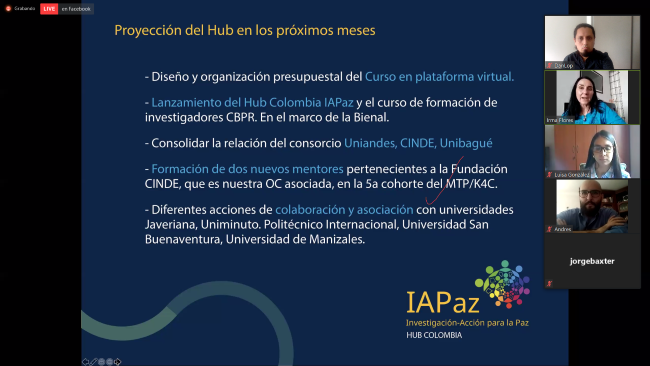
Course design on CBPR/PAR:
The course Community-centered participatory action research is an experiential experience that introduces participants to concepts, principles, and participatory methodologies to accompany social transformation processes. This course has been approved by the University of Los Andes, and it will be launched during the second semester of 2021.
At this course, the participants will develop knowledge, skills, and attitudes, to carry out social change processes with communities, based on the understanding of the complexity of the context of these communities, dialogue, horizontal interaction, and effective participation of the actors. The course also seeks to strengthen the democratization of knowledge by using multiple ways of validating knowledge production that allows building a path to create change and claiming social justice.
Creation of transformative dialogue spaces between members of Research Training Groups of University of los Andes and University of Ibagué:
Spaces for interaction have been developed between students of research groups of the Universidad de los Andes and the Universidad de Ibagué. The above, favoring a space for dialogue and training that addressed issues related to participatory research methodologies, implementation of actions with local actors, and respect for the voices of the territories. These meetings contribute not only to the training of students but also to the construction and consolidation of a team of inter-university trainers.
Course design on art-based methods:
This course presents an introduction to arts-based research (ABR) as a way of producing knowledge through the use or inclusion of the arts in social science research processes. The course covers the use of different art forms as strategies for the collection, analysis and dissemination of qualitative information in the context of participatory action research. The course emphasizes the importance of developing the production of knowledge in community contexts through sentipensamiento (feeling & thinking), in order to strengthen processes of reflection. This proposal provides a set of powerful tools for participatory work with communities. The course has been designed and is now approved by the Universidad de los Andes to start with students sometime in the second semester of 2021.
CONTACT DETAILS OF THE HUB COORDINATOR
Irma Alicia Flores Hinojos, Ph D, Associated Professor, University of los Andes, Colombia, Faculty of Education– ia.flores24@uniandes.edu.co




